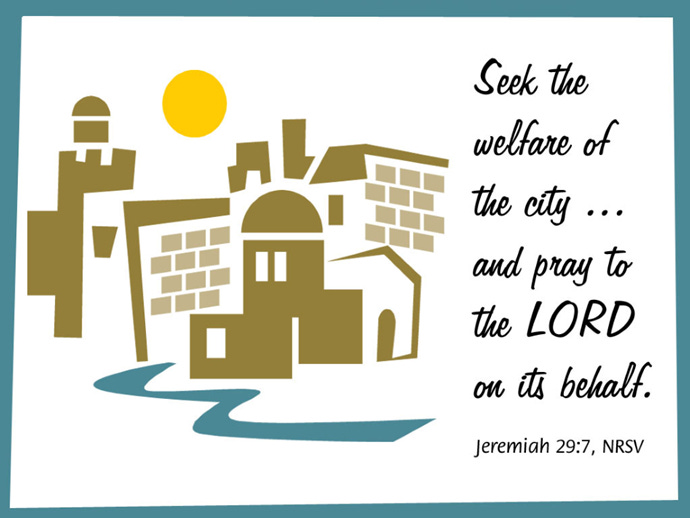wish you would hear
the benefits of exile(!)
Have you ever felt spiritually exiled—not geographically removed, but emotionally or spiritually dislocated from where you thought you belonged?
Maybe someone has been at Thanksgiving dinner with that certain family member present who likes to air his or her annoying opinions. It could be political, religious, or cultural. Maybe it’s the one who makes inappropriate remarks. Is there someone who chastises you on your life decisions? “You know, if I had been you…” “I don’t want to be critical, but…”
For four or five hours, you might feel like you’re living in exile!
In 2015, my wife Banu and I moved to Tennessee, largely to help with my mother’s health and some house repair. During that time away from our denominational home, Banu and I explored new directions—chaplaincy, teaching, even a different ordination path. We toyed with the idea of moving to the Episcopal Church, but every door stayed closed. We realized our call hadn’t changed—just the context. We realized that, for right then, we needed to settle down, at least regarding our direction in life.
Jeremiah says something like that in his letter to the exiles in Babylon, which is well over 500 miles from home. The exiles taken from Judah, the Babylonian captivity, are an excellent example of people in transition. They certainly didn’t choose this transition. But this is transition, big time! They’re thrust into a new reality—radical, heartbreaking, and definitely unwanted.
So, they have this change. The question is, how will they experience this change? They’ve been plopped down in the thick of it. Now what? That’s where the prophet Jeremiah steps in. He was active in the years before and after the fall of Jerusalem to the Babylonians (587 BCE).
Jeremiah has long been warning his fellow compatriots about the imminent threat of exile. For his trouble, he’s been ostracized, accused of treason, beaten, and imprisoned. No wonder his nickname is “the weeping prophet.”
Chapter 32 of the book of Jeremiah records his buying land while the country is being invaded—not the best time to purchase real estate! Still, God promised him, “Houses and fields and vineyards shall again be bought in this land” (v. 15). There will be people who return from exile.
And on this occasion, he’s writing a letter to the exiles, suggesting the transition that can shape their experience of change.
One writer sums it up like this: “The opening words of a pastoral letter sent to the exiles in Babylon: Get used to it; build a life in exile. Adjust: build, plant, marry.” In other words, make this your home. That sounds completely insane, and frankly, quite offensive.
And Jeremiah doubles down, “Seek the shalom (welfare) of the city… The mission is not to overthrow a hostile regime, but to hold the regime to its own best promises.” (257)
In a very different context, we read in Acts 16 how the apostle Paul behaved after his illegal arrest in Philippi. When the magistrates wanted to release him and Silas quietly, he snapped back, “They have beaten us in public, uncondemned, men who are Romans, and have thrown us into prison, and now are they going to discharge us in secret? Certainly not!” (v. 37).
The magistrates were terrified, knowing they had violated the rights of Roman citizens. Paul understood how to use the law to push for justice for himself and others. He wants to hold the Roman Empire to its best promises. We in America could learn a lesson or two from the apostle.
But back to Jeremiah’s audience. His message is, “The empire can practice shalom… Close your ears to liars who say we’re going back to normalcy. Dismiss such illusions of escape. Instead, make do, witness in your situation.”
We can see some themes here. First, there’s Jeremiah in a pastoral role. It might be hard to imagine that party-pooping prophet as a pastor, but he really does love the people.
Second, there’s the instruction that they should stay put and build a life for themselves. Don’t preach armed rebellion! Rather, plant a garden. Love your neighbor. Invite them over for dinner.
Third, they are reminded that they won’t simply be living there, but they also have an assignment. Their job is to witness—to testify!—that their God is still with them, even in the far away land of Babylon. It’s important to recognize that exile is not just punishment, but it’s also formation. God’s people are reshaped in exile.
We have served as interim pastors in two different congregations. Just as Jeremiah guided his people in their exile, intentional interim pastors help congregations navigate times of transition. Typically, five tasks are mentioned: Listening to History, Discovering a New Identity, Leadership Changes and Empowering New Leaders, Rethinking Denominational Linkages, and Commitment to New Leadership and to a New Future.
That bit about discovering a new identity can be really tricky. There can be a fine line between holding on to what is still relevant and life-giving from the past and saying goodbye to what no longer serves us. We learn from the exiles that in saying goodbye, there is loss to be grieved. Making room for grief is essential for spiritual, mental, and even physical health.
Sometimes it helps to just have a good cry!
Jeremiah says God wants them to discover a new identity, as we have just seen, to “seek the welfare of the city where I have sent you into exile, and pray to the Lord on its behalf, for in its welfare you will find your welfare” (v. 7). This is how they need to witness—exercise some holy defiance. Show those around you that you lovingly claim the future into which God is leading you.
But some voices are tenacious. “Ignore the advice of this traitor. Keep resisting. Never surrender!” Jeremiah issues the warning: those voices are not from God.
Indeed, the Lord says, “Do not let the prophets and the diviners who are among you deceive you, and do not listen to the dreams that they dream, for it is a lie that they are prophesying to you in my name; I did not send them, says the Lord” (vv. 8-9).
Jeremiah must be going crazy about this. He must want to tell them not, “I wish you were here,” but “I wish you would hear.” (And in case you haven’t figured that out, it is, h-e-r-e versus h-e-a-r.)
This business of rebuking false prophets might be a bit extreme for our situation, but it can be difficult to take the step of discovering a new identity. There might not need to be a sharp break with the past. Yet the willingness to simply let go opens us to an updated self-image, God’s new name for us. And that helps in our witness.
I like something the late Walter Brueggemann said about the exiles’ staying put, seeking the well-being of the place where they’ve been sent, and doing the difficult work on a new identity. It places on “this vulnerable, small community a large missional responsibility. In this way, the community is invited into the larger public process of the empire.” (257)
That’s a fancy way of saying that daring to ask ourselves, “Who do we want to be?” “How do we adapt to our changing world?” “Where is the Spirit leading us?” All of that makes us vulnerable. As with the exiles in Babylon, our mission reminds us to not withdraw into our own narrow concerns. Don’t hunker down into a fortress or a scarcity mentality.
Let’s end with verse 11 of our chapter, the promise to the exiles and, by extension, to us. “Surely I know the plans I have for you, says the Lord, plans for your welfare and not for harm, to give you a future with hope.” That’s a rock-solid guide during all of the interims and exiles of our lives.
Friends, whether we find ourselves in the exile of awkward family gatherings, unexpected life transitions, or seasons of congregational change, Jeremiah’s message remains. We are not abandoned.
Like those ancient exiles in Babylon, we are invited to plant gardens where we are (or in the words made famous by the philosopher Mary Englebreit, “bloom where you are planted”).
We are encouraged to seek the welfare of our neighbors, and to trust that God’s plans for us are good. In our vulnerability, in our willingness to discover and embrace new identities, in our commitment to stay present rather than retreat—this is where we find hope, the firm foundation built on Jesus Christ.





